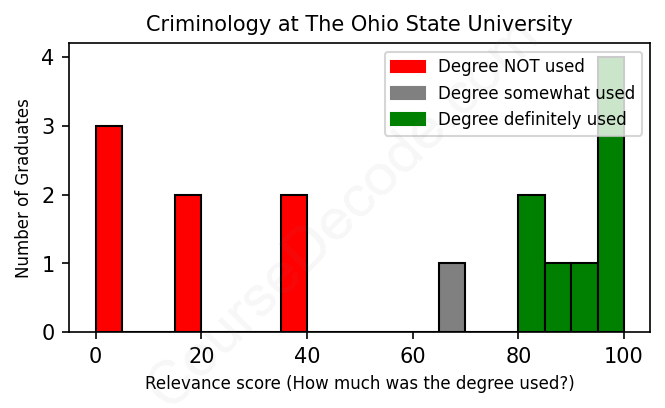
First, some facts. Of the Criminology graduates from The Ohio State University we've analyzed , here's how many have used (or NOT used) their degree in their career:

These are estimates based on AI analysis of 16 LinkedIn profiles (see below).
The verdict? Significantly below average. Overall, with an average relevance score of 56%, Criminology graduates from The Ohio State University have a much lower likelihood (-11%) of finding work in this field compared to the average graduate across all fields:
And for comparison, here's the chart for all profiles we've looked at across all degrees.
Also, after graduating, only 31% of these graduates have pursued further education other than another Bachelor's degree (such as a Masters degree or other), compared to the average across all profiles of 35%. This suggests a Bachelors degree is enough for most Criminology graduates, and it's normal to look for work straight after graduation.
See the details:
|
Relevance score: 100% We think this person has gone into a career highly relevant to their degree. We think this person has gone into a career highly relevant to their degree.
DEGREE INFOGraduated in 2010 from The Ohio State University with a Bachelor of Arts - BA in Criminology. No other secondary education since. JOB HISTORY SINCE GRADUATIONDeputy Sheriff Franklin County Sheriff's Office Apr 2014 - Jan 2017 Detective  The Ohio State University Division of Police Jan 2017 - Present ABOUTNo information provided. |
The top 10 most common jobs done by the graduates we've analyzed (ranked most common to least) are:
From analyzing the job placements of Criminology graduates from The Ohio State University, it’s clear that the most common careers tend to gravitate towards law enforcement, corrections, and roles within criminal justice systems. Positions like Deputy Sheriff, Detective, and various correctional officer roles are very relevant as they require direct application of criminological knowledge. For example, being a Deputy Sheriff or working as a Detective means you’re utilizing skills learned in criminology every day, from understanding criminal behavior to employing investigative techniques. Even roles like Probation Parole Officers and Correction Classification Specialists highlight the use of criminology in monitoring offenders and assessing rehabilitation needs.
However, the picture isn’t entirely bright. A sizable number of graduates ended up in jobs that have minimal to no relation to their criminology training. Many found themselves in sales, customer service, or tech roles that require skills distanced from the core principles of criminology. For instance, positions like Account Coordinator, English Teacher, and various roles within the tech sector don't harness criminological concepts at all. While these experiences can still be valuable in honing general skills, they might not fulfill the expectations many have when pursuing a degree in Criminology. So, while there’s a solid vein of relevant positions for criminology graduates, there’s also a diverse spread of unrelated jobs that showcases how varied career paths can be post-graduation.
Here is a visual representation of the most common words in job titles for Criminology graduates (this is across all Criminology graduates we've analyzed, not just those who went to The Ohio State University):

Looking at the career paths of Criminology graduates from The Ohio State University, it seems like they have a pretty diverse set of trajectories. For many, their first job straight after graduation is often in the public service or law enforcement sector. Positions like deputy sheriffs, correctional officers, and probation officers are common first steps, which makes sense given their degree. As they gain more experience, many remain in related fields but might move into roles with more responsibility, like detectives or program specialists within correctional systems.
However, not everyone sticks to their criminology roots. Some graduates have veered off into areas that are not directly related to criminal justice, such as sales or business positions, which is evident in the cases of graduates who moved into roles at companies like Verizon and JPMorgan Chase. This shift might hint at a broader job market where graduates feel they have to adapt their careers beyond strictly criminology-related roles. Fast forward five or ten years, and while some find stable and progressive roles in law enforcement or criminal justice, others end up in completely different industries. In the grand scheme of things, it appears that many graduates initially aim for careers tied to their degree, but the reality of the job market sees a good number branching off into various fields, which is a mixed bag when it comes to career progression directly tied to criminology.
Honestly, a Bachelor’s degree in Criminology at The Ohio State University is pretty standard in terms of difficulty. It's not the hardest major out there, but it's definitely not a walk in the park either. You'll dive into a lot of social science concepts, stats, and maybe some psychology, which can be challenging if those subjects aren't your strong suit. There are some essays, research projects, and case studies to tackle, so you'll need to stay on top of your assignments. Overall, it's manageable, especially if you're interested in the material, but like any college degree, it requires time and effort. Just be prepared to put in the work, and you’ll generally be fine!
Most commonly, in the LinkedIn profiles we've looked at, it takes people 4 years to finish a Bachelor degree in Criminology.
Looking at the job paths of these Criminology graduates from Ohio State, it seems there's a mixed bag when it comes to salary potential. Those who went into law enforcement, like the deputy sheriff and police officer, probably have a decent income, especially with some of them moving into higher roles like detective and regional sales director. On the flip side, several others found themselves in more mid-range or entry-level positions for quite a while, like the ESL teachers or the people who worked in customer service, which likely didn’t pay as well. The ones who hopped into corporate roles, especially in tech or management at places like JPMorgan and Verizon, likely hit that higher earning potential sooner. Overall, while some have found solid financial footing, others have taken longer or may still be climbing the ladder to better pay.
Here is a visual representation of the most common words seen in the "about" section of LinkedIn profiles who have a Bachelor degree in Criminology (this is across all Criminology graduates we've analyzed, not just those who went to The Ohio State University). This may or may not be useful:

Here are all colleges offering a Bachelor degree in Criminology (ordered by the average relevance score of their Criminology graduates, best to worst) where we have analyzed at least 10 of their graduates:
| College | Score | Count |
|---|---|---|
 California State University, Fresno California State University, Fresno
|
67 | 20 |
 George Mason University George Mason University
|
63 | 27 |
 Arizona State University Arizona State University
|
58 | 17 |
 Missouri State University Missouri State University
|
57 | 11 |
 The Ohio State University The Ohio State University
|
56 | 16 |
 Penn State University Penn State University
|
55 | 16 |
 Florida State University Florida State University
|
54 | 60 |
 West Virginia University West Virginia University
|
51 | 20 |
 University of Maryland University of Maryland
|
51 | 11 |
 John Jay College (CUNY) John Jay College (CUNY)
|
50 | 21 |
 University of South Florida University of South Florida
|
49 | 47 |
 Central Connecticut State University Central Connecticut State University
|
49 | 13 |
 University of Florida University of Florida
|
48 | 21 |
 The University of Texas at Dallas The University of Texas at Dallas
|
48 | 10 |
 Indiana University of Pennsylvania Indiana University of Pennsylvania
|
48 | 20 |
 Mississippi State University Mississippi State University
|
46 | 10 |